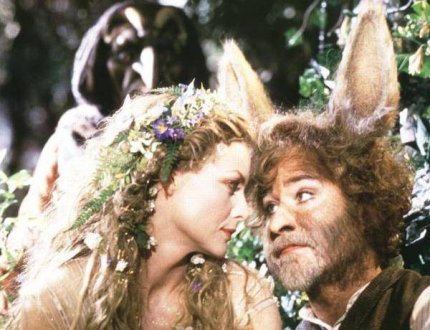Captain of our fairy band,
Helena is here at hand,
And the youth, mistook by me,
Pleading for a lover's fee.
Shall we their fond pageant see?
Lord, what fools these mortals be!
- William Shakespeare - A Midsummer Night's Dream
Whatever your brilliant idea is, Shakespeare thought of it first. John Tierney writes in today's
Science Times about the neuroscientist Larry Young and his
theory of love. Prairie voles tend, unlike most mammals to mate monogomously.
When a female prairie vole’s brain is artificially infused with oxytocin, a hormone that produces some of the same neural rewards as nicotine and cocaine, she’ll quickly become attached to the nearest male. A related hormone, vasopressin, creates urges for bonding and nesting when it is injected in male voles (or naturally activated by sex).
Oxytocin, produced during childbirth and nursing, is the same chemical that stimulates bonding between mother and child. So motherly love is, neurochemically, the prototype of adult love. I am sure Dr. Freud, wherever he is, has just lit up a celebratory cigar and the attachment theorists are throwing a champagne party!

Researchers are now playing around with manipulating oxytocin levels in humans and discussing its use in everything from encouraging more typical social relations in people with autism to marriage counseling. But researchers are noticing, as Shakespeare did, that problems might arise if the wrong partner is targeted. They are also playing around with the idea of a vaccine that inhibits mating and nesting impulses. So the first drug could make you fall in love with an ass and the second might keep you from acting like one yourself. And Shakespeare thought of that one too.
 Researchers are now playing around with manipulating oxytocin levels in humans and discussing its use in everything from encouraging more typical social relations in people with autism to marriage counseling. But researchers are noticing, as Shakespeare did, that problems might arise if the wrong partner is targeted. They are also playing around with the idea of a vaccine that inhibits mating and nesting impulses. So the first drug could make you fall in love with an ass and the second might keep you from acting like one yourself. And Shakespeare thought of that one too.
Researchers are now playing around with manipulating oxytocin levels in humans and discussing its use in everything from encouraging more typical social relations in people with autism to marriage counseling. But researchers are noticing, as Shakespeare did, that problems might arise if the wrong partner is targeted. They are also playing around with the idea of a vaccine that inhibits mating and nesting impulses. So the first drug could make you fall in love with an ass and the second might keep you from acting like one yourself. And Shakespeare thought of that one too.
















2 comments:
Shakespeare, voles, oxytocin and love -- only here at Bookeywookey. Thanks, Ted. This post made me smile.
Thanks, Cam! We haven't heard much from you lately. I keep checking as I'm looking forward to a new post. We're seeing Orfeo ed Euridice at the Met on the 24th, the day of the HD broadcast. Are you going?
Post a Comment